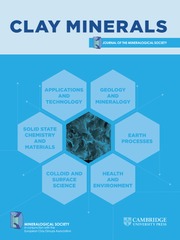Crossref Citations
This article has been cited by the following publications. This list is generated based on data provided by
Crossref.
Ruiz Cruz, M. D.
and
Moreno Real, L.
1991.
Practical determination of allophane and synthetic alumina and iron oxide gels by X-ray diffraction.
Clay Minerals,
Vol. 26,
Issue. 3,
p.
377.
ÖBorn, Ingrid
1991.
Plant-Soil Interactions at Low pH.
p.
55.
Segall, M.P.
and
Kuehl, S.A.
1992.
Sedimentary processes on the Bengal continental shelf as revealed by clay-size mineralogy.
Continental Shelf Research,
Vol. 12,
Issue. 4,
p.
517.
Egashira, Kazuhiko
Osaka, Koji
and
Nakashima, Seishiro
1992.
Technical classification of the clay mineralogical composition of paddy soils using multivariate analysis in reference to rice production.
Soil Science and Plant Nutrition,
Vol. 38,
Issue. 3,
p.
431.
Ruiz Cruz, M. D.
and
Moreno Real, L.
1993.
Diagenetic Kaolinite/Dickite (Betic Cordilleras, Spain).
Clays and Clay Minerals,
Vol. 41,
Issue. 5,
p.
570.
Ruiz Cruz, M. D.
1994.
Diagenetic Development of Clay and Related Minerals in Deep Water Sandstones (S. Spain): Evidence of Lithological Control.
Clay Minerals,
Vol. 29,
Issue. 1,
p.
93.
Felix-Henningsen, P.
1994.
Mesozoic-Tertiary weathering and soil formation on slates of the Rhenish Massif, Germany.
CATENA,
Vol. 21,
Issue. 2-3,
p.
229.
Ruiz Cruz, M. D.
and
Andreo, B.
1996.
Genesis and transformation of dickite in Permo-Triassic sediments (Betic Cordilleras, Spain).
Clay Minerals,
Vol. 31,
Issue. 2,
p.
133.
Ruiz Cruz, M. D.
1996.
Dickite, Nacrite and Possible Dickite/Nacrite Mixed-Layers from the Betic Cordilleras (Spain).
Clays and Clay Minerals,
Vol. 44,
Issue. 3,
p.
357.
Egashira, K.
Fujii, K.
Yamasaki, S.
and
Virakornphanich, P.
1997.
Rare earth element and clay minerals of paddy soils from the central region of the Mekong River, Laos.
Geoderma,
Vol. 78,
Issue. 3-4,
p.
237.
Egashira, Kazuhiko
Iwashita, Soichi
and
Yamasaki, Shin-ichi
1997.
Clay mineral status of paddy soils from the Tai Lake Region of China in relation to high paddy-rice productivity.
Soil Science and Plant Nutrition,
Vol. 43,
Issue. 3,
p.
521.
Ruiz Cruz, M.D.
and
Reyes, E.
1998.
Kaolinite and dickite formation during shale diagenesis: isotopic data.
Applied Geochemistry,
Vol. 13,
Issue. 1,
p.
95.
Ruiz Cruz, M. D.
1999.
Clay mineral assemblages in flysch from the Campo de Gibraltar area (Spain).
Clay Minerals,
Vol. 34,
Issue. 2,
p.
345.
Garcı́a-Sánchez, A.
Alastuey, A.
and
Querol, X.
1999.
Heavy metal adsorption by different minerals: application to the remediation of polluted soils.
Science of The Total Environment,
Vol. 242,
Issue. 1-3,
p.
179.
Wilson, M. J.
1999.
The origin and formation of clay minerals in soils: past, present and future perspectives.
Clay Minerals,
Vol. 34,
Issue. 1,
p.
7.
Kirsimäe, K.
Jøgensen, P.
and
Kalm, V.
1999.
Low-temperature diagenetic illite-smectite in Lower Cambrian clays in North Estonia.
Clay Minerals,
Vol. 34,
Issue. 1,
p.
151.
Garcia Sanchez, A.
Alvarez Ayuso, E.
and
Jimenez de Blas, O.
1999.
Sorption of heavy metals from industrial waste water by low-cost mineral silicates.
Clay Minerals,
Vol. 34,
Issue. 3,
p.
469.
Ohtsubo, M.
Egashira, K.
Tanaka, H.
and
Mishima, O.
2002.
Clay Minerals and Geotechnical Index Properties of Marine Clays in East Asia.
Marine Georesources & Geotechnology,
Vol. 20,
Issue. 4,
p.
223.
García- Sanchez, A.
Alvarez-Ayuso, E.
and
Rodriguez-Martin, F.
2002.
Sorption of As(V) by some oxyhydroxides and clay minerals. Application to its immobilization in two polluted mining soils.
Clay Minerals,
Vol. 37,
Issue. 1,
p.
187.
Kahle, Maren
Kleber, Markus
and
Jahn, Reinhold
2002.
Review of XRD-based quantitative analyses of clay minerals in soils: the suitability of mineral intensity factors.
Geoderma,
Vol. 109,
Issue. 3-4,
p.
191.


